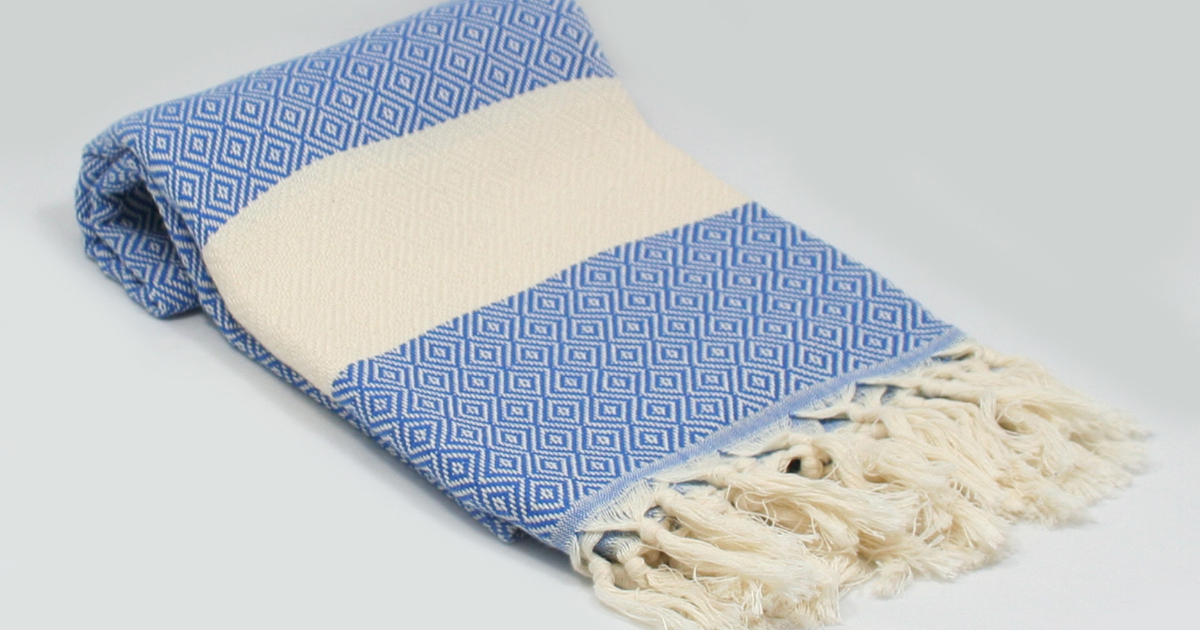Turkish towels and regular cotton towels are both great options for drying off and getting cozy after a shower or swim.

But they have some key differences in terms of materials, construction, absorbency, drying time, versatility and more.
What is a Turkish Towel?
A Turkish towel, also known as a pestemal or peshtemal, is a unique variety of lightweight, flatwoven cotton towel originating in Turkey.
Turkish towels are made from Turkish cotton, which features extra long cotton fibers that create a strong yet flexible fabric when woven. The climate in Turkey allows the cotton to grow with longer, smoother fibers than cotton from other regions.
These special towels are woven to be thin, lightweight and quick-drying – but still highly absorbent thanks to their structure. Traditional Turkish towels feature fringed edges and colorful striped or checked designs.
What is a Regular Cotton Towel?
When we talk about regular cotton towels, we’re referring to the plush, terry cloth towels found in many American and European bathrooms and kitchens.
These towels are woven using an extra pile yarn to create lots of little absorbent loops or piles of cotton that efficiently soak up water. The most common regular bath towels are made from short- or medium-staple cotton grown in places like China, India and the USA.
So regular cotton towels rely on their fluffy pile for absorbency, while Turkish towels soak up moisture in their flat, smooth weave.
Absorbency
- Turkish towels rely on their long cotton fibers and special flat weave to wick up water effectively. Though they don’t have a thick pile, they absorb surprisingly well.
- Cotton terry towels have an advantage in plushness and absorbency thanks to all those little cotton loops that help sop up moisture.
- So for maximum water-wicking ability, regular cotton terry towels are superior. But Turkish towels absorb well for their thinness.
Key Takeaway: Cotton terry beats out flatwoven Turkish towels for absorbency due to its thick, plush pile construction.
Drying Time
- Turkish towels woven from cotton with extra-long fibers dry very quickly – usually in an hour or less if hung to dry.
- Meanwhile, thick regular cotton towels can take several hours up to overnight to fully dry.
- So for a fast-drying towel, especially in humid climates, Turkish cotton towels are the clear winner. Their thin structure simply doesn’t retain as much moisture.
Key Takeaway: Turkish towels made of long-fiber cotton dry extremely fast compared to thick, plush terry cloth.
| Towel Type | Pile Thickness | Drying Time |
|---|---|---|
| Turkish Towel | Thin, flatwoven | 1 hour or less |
| Regular Cotton Terry Towel | Thick, fluffy pile | Several hours to overnight |
Durability
- Turkish towels woven from extra-long staple cotton fibers are very durable, and get even softer over time. Their special flat woven structure makes them last through years of washing and drying without falling apart.
- Regular cotton towels have a tendency to shed cotton loops and get thinner and rougher with frequent use and laundering. So they don’t have as long a lifespan as Turkish towels.
So for longevity and maintaining integrity after repeated laundering:
- Turkish cotton towels last longer
- Cotton terry towels degrade more quickly
Key Takeaway: The long Turkish cotton fibers and flatwoven structure make Turkish towels more durable than regular cotton terry in the long run.
Softness
- Fresh out of the package, plush cotton terry towels feel softer thanks to their fluffy piled yarns.
- Sleek Turkish towels have a smooth, flat surface that feels thinner and less cuddly.
- But with washing and drying, Turkish towels get increasingly soft and supple over time, while regular cotton towels lose their plush feel and get rougher.
- So for out-of-the-package softness, cotton terry wins. But properly cared for Turkish towels develop superior softness and suppleness long-term.
Key Takeaway: Cotton terry towels start out softer, but well-maintained Turkish cotton towels become softer through many cycles of washing and drying.
Weight
- Cotton terry towels have all that thick piled fabric, which makes them heavier, especially when holding water.
- Turkish towels feel extremely lightweight even when wet thanks to their special flat woven structure.
- So if you want a lighter towel option for travel, backpacking or just carrying around the house, Turkish cotton towels have the advantage.
Key Takeaway: The thin flatwoven Turkish cotton makes these towels far lighter in weight compared to plush, thick terry cloth.
Versatility
- Turkish cotton towels are lightweight enough to pull double duty as scarves, shawls, wraps, tablecloths and more.
- Bulky regular terry cloth towels pretty much just work as towels and don’t lend themselves to other creative uses.
So for multi-purpose functionality beyond just drying off, Turkish towels are vastly more versatile.
Price
- Simple regular cotton terry towels are widely available at affordable prices, especially large multi-packs.
- Turkish cotton towels take more specialized manufacturing, so they are pricier – though costs vary greatly by brand.
- For those on a budget, standard cotton terry is typically the more affordable choice. But Turkish towels often offset their higher prices with longevity and multi-purpose use.
Climate Considerations
- In hot, humid climates, Turkish cotton towels have an advantage with their thin structure that dries quickly – preventing mildew issues.
- Thick regular terry towels retain a lot more moisture and take longer to dry, making them prone to getting musty in tropical climes.
- So along the Gulf Coast or tropical regions, quick-drying Turkish towels may work better.
FAQs
Which is better, Turkish or Egyptian cotton towels?
Both Turkish and Egyptian cotton are considered superior for towels thanks to their exceptionally long fibers. But Turkish cotton makes the best bath towels due to its special flatwoven structure that is thinner yet very absorbent. Egyptian cotton‘s longer fibers are ideal when used for plush pile towels to maximize softness and water absorption.
How do you wash and care for Turkish towels?
Caring for Turkish towels properly maintains their integrity over many years of use.
- Wash in cold or warm water using a gentle laundry soap
- Don’t use fabric softener or dryer sheets
- Wash towels separately from rough items
- Line dry or machine dry on low heat; avoid high heat
- Expect some shrinkage after 1-2 initial washes
Why are Turkish towels good for outdoor use?
The thin yet highly absorbent structure of Turkish towels makes them perfect for drying off quickly at the pool, beach or gym while not retaining too much water. They are also very compact for toting in bags and backpacks. Many outdoor-centric Turkish towels even come with handy loops or corner ties and bright, fun colors/patterns suited for travel.
What is the benefit of a flatweave vs. terry cloth cotton?
Terry cloth towels excel at maximum plush softness and water absorption thanks to their piles of fluffy cotton loops. Flatweave fabrics like Turkish towels don’t have an extra pile yarn, creating a smooth, thinner fabric that still absorbs well. Flatweaves are significantly lighter, thinner, more versatile and quicker to launder and dry – but terry cloth is ultimately plusher and more absorbent.
Can you put Turkish towels in the dryer?
It’s best to line-dry Turkish cotton towels to prevent shrinkage and maintain integrity over many years of use. But occasional machine drying won’t destroy them – just use low or medium heat cycles, and avoid very high heat. Adding a couple tennis balls to the dryer can help prevent damage to the flatweave structure while adding softness.
Are Turkish towels better for your skin?
The extra-long staple Turkish cotton fibers woven into sleek flat towels are exceptionally soft and gentle on skin. And since they are highly absorbent yet quick-drying, they can lend a light exfoliating effect while drying that rejuvenates skin by increasing blood flow.
For those prone to irritation, the smooth flatweave may cause less friction damage compared to thick terry cloth loops rubbing on delicate skin. So yes, Turkish towels do have skincare advantages compared to regular cotton terry or microfiber towels.
Should I get Turkish or bamboo towels?
Turkish cotton and bamboo rayon are both prized for crafting sustainable, antimicrobial towels. Bamboo-derived rayon fibers yield a fabric with a silky-soft drape when woven into plush towels, but it is also lightweight and absorbs well. Both bamboo and Turkish cotton towels share quick-drying properties. So the choice ultimately comes down to a personal preference between bamboo’s ultra-soft luxury feel, and Turkish cotton’s crisp texture plus vibrant colors and patterns.
Conclusion
Whether you prefer the traditional thick and fluffy cotton terry towel experience, or want to try out the lightweight versatility and longevity of unique flatwoven Turkish towels – knowing the differences can help you select what best suits your personal needs.
The quick-drying Turkish towels crafted from specialized long-staple cotton strike an ideal balance of absorbency, softness and multi-purpose functionality. But regular cotton terry cloths excel at plush absorbency and cozy warmth straight out of the package.







